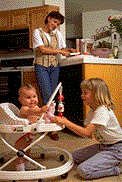|

1. Remember, there is no such thing as a "child
proof" cap.
2. Your newborn is now "mobile" so child-proofing, if not done at 6 months, is a priority. Get down on
the floor at your baby's eye level and see what the infant can get in to.
3. Remove dangling telephone, electrical,
blind, or drapery cords near your baby's crib or play areas.
4. Continue to use a rear-facing safety seat properly
secured in the back seat of the car each time. If using an infant-only safety seat, switch to a rear-facing convertible safety
seat intended for babies up to 40 pounds (18 kg) when your baby weighs 20 to 30 pounds (9 to 13 kg) or is 26 inches (66 cm)
long. Never place your baby's safety seat in the front seat of a vehicle with a passenger air bag. The back seat is the safest
place for children of any age to ride.
5. Continue to put your baby to sleep on his back or side and avoid the use
of soft bedding. If you use a mesh playpen or portable crib, the weave should have small openings less than 1/4 inch (6 mm).
Never leave your baby in a mesh playpen or crib with the drop-side down.
6. Do not leave your child alone in a tub
of water or on high places such as changing tables, beds, sofas or chairs. Always keep one hand on your baby.
7. Wash
your hands and your baby's hands, especially after diaper changes and before feedings. Clean your baby's toys with soap and
water.
8. Avoid using baby walkers. There is considerable risk of major and minor injury and even death from the use
of walkers. There is no clear benefit from the walker's use.
9. If your home uses gas appliances, install and maintain
carbon monoxide detectors.
10. Always empty buckets, tubs or small pools immediately after use. Ensure that swimming
pools have a four-sided fence with a self-closing, self-latching gate. Swimming pools are deadly to children at this age.
11. Continue to keep the baby's environment free of smoke. Keep the home and car nonsmoking zones.
12. Avoid
overexposure to the sun. A waterproof sun screen with an SPF more than 15 is OK. Even with sun screen, avoid the hours between
10 a.m. and 3 p.m., when the sun is most dangerous.
13. Do not leave heavy objects or containers of hot liquids on
tables with tablecloths that the baby may pull down.
14. Do not give your baby plastic bags or latex balloons.
15.
Place plastic plugs in electrical sockets.
16. Keep all poisonous substances, medicines, cleaning agents, health and
beauty aids, and paints and paint solvents locked in a safe place out of the baby's sight and reach. Never store poisonous
substances in empty jars or soda bottles. Keep the number of your local poison control center near the telephone, and call
immediately if there is a poisoning emergency.
17. Ask your doctor about having some Syrup of Ipecac (to induce vomiting)
in the home to be used only after consulting with the poison control center or the baby's physician. Keep the number of the
poison control center near the telephone.
18. Install gates at the top and bottom of stairs, and place safety devices
on windows.
19. Lower the crib mattress.
20. Forget about using an infant walker.
21. Learn first
aid and child cardiopulmonary resuscitation (CPR).
For more information visit:
Town and Country Pediatrics!
Bright Futures.Org: 0 to 11 months!
|

